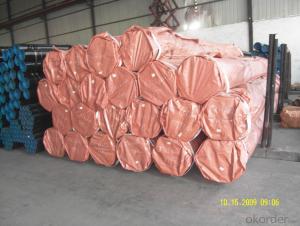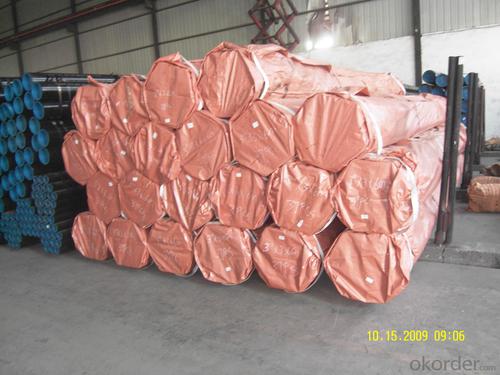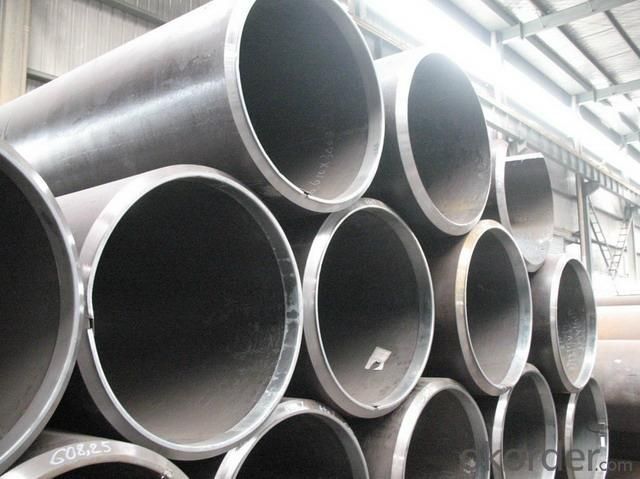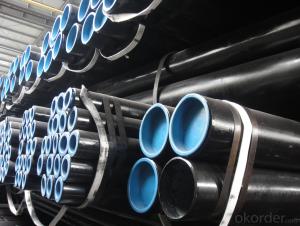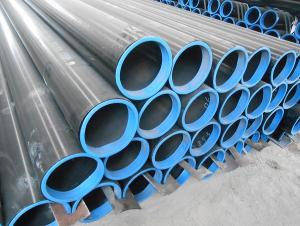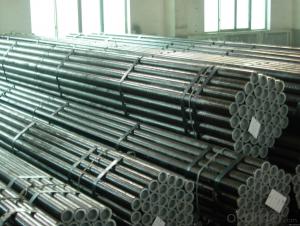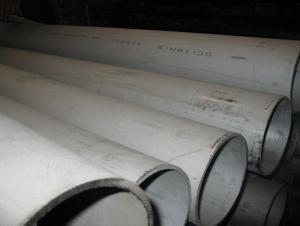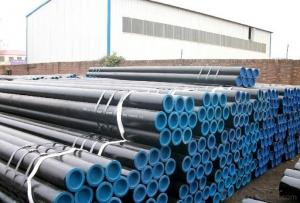Seamless Hot Rolled Steel Pipe > 114.3
- Loading Port:
- China Main Port
- Payment Terms:
- TT or LC
- Min Order Qty:
- 100 m.t.
- Supply Capability:
- -
OKorder Service Pledge
OKorder Financial Service
You Might Also Like
Specifications
1. OD 21MM-1066MM, WT 2MM-60MM
2. certificate: ISO, API
3. Strength: large diameter thick wall seamless pipe
4. BE, PE.
Carbon Steel Seamless Pipes | |
OD | 21.3mm-1066.8mm(1/2”-42”) |
WT | 2mm-60mm |
Length | Random Length: 3.5m-12m, or fixed length 5.8m or as the customer’s requirement. |
Standard | ASTM A53, ASTM A106, API 5L, DIN 17175, GOST8731/8732, G3457/G3452 etc. |
Material | Q235B, 10#,20#,45#, 16Mn, 15MnV. A53B, A106B, API5L B, A192, A179C, A213-T12, A213-T22, A335-P1, A335-P2, A333 ST37, ST33, ST37-2, ST35.8 ST42 etc. |
Certificate | API certificate and ISO certificate. |
Surface | Rust remove, black painting, antirust oil, varnish, 3PE, hot-dip galvanized etc. |
Package | By bundles, plastic caps or steel caps, woven, wooden cases or as requirement. |
Capability | 6000tons/month. |
End | BE/PE. |
Advantage | Big diameter and thick wall pipes. Best price with good quality. The partner you can trust. Good service and very patient. |
Seamless steel pipe | ||||
Alloy pipe | Cr5Mo(P5, STFA25, T5) 15CrMo(P11, P12, STFA22) 13CrMo44 12Cr1MoV P22 (10CrMo 910) T91, P91, P9, T9 Wb36 | GB5310-95 GB9948-88 ASTM335/A335M ASTM213/213M DIN17175-79 JISG3467-88 JISG3458-88 | 16-824*2-100 | The seamless steel pipe features resistance to high pressure, high/low temperature and corrosion and is used in the industries of petroleum, chemical engineering and electric power as well as boiler |
High-pressure boiler pipe | 20G, A106, ST45.8/ | GB5310-95 ASTMA106-99 DIN17175-79 | 14-630*2-80 | Temperature-resistant seamless steel pipe for high-pressure boiler |
High-pressure seamless pipe for petroleum cracking and fertilizer making equipments | 20, 12CrMo, 15CrMo | GB9948-88 | 10-530*1.5-36 | Boiler price for refinery, heat-exchanging pipe, seamless steel pipe for pipeline |
20, 16Mn, Q345 | GB6479-2000 | 18-530*3-40 | Fertilizer making equipment and pipe line | |
Low and medium pressure boiler pipes | 10, 20 | GB3087-1999 | 10-530*2-40 | Over-heat pipe for low and medium-pressure boiler, boiling water pipe, locomotive smoke pipe(big and small) |
Fluid pipe | 20, Q345 | GB/T8163-1999 | 8-630*1.0-40 | |
Structural pipe | 10,20,35,45, 16Mn, Q345B | GB/T8162-1999 | 6-1020*1.5-100 | |
Line pipe | Grade B | API | 60-630*1.5-40 | Carrying gas, water or oil in the industries of petroleum and natural gas |
Hydraulic prop pipe | 27SiMn | GB/T17396-1998 | 70-377*9-40 | |
Ship pipe | 410 | GB/T5312-1999 | 14-426*1.5-45 | Pipes for ship, boiler and over-heater |
FAQ of Seamless Pipe:
①How is the quality of your products?
Our products are manufactured strictly according to national and internaional standard, and we take a test on every pipe before delivered out. Guaranteed: If products’ quality don’t accord to discription as we give or the promise before you place order, we promise 100% refund.
②How about price?
Yes, we are factory and be able to give you lowest price below market one, and we have a policy that “ for saving time and absolutely honest business attitude, we quote as lowest as possible for any customer, and discount can be given according to quantity.
③Why should you chose us?
Chose happens because of quality, then price, We can give you both.Additionally, we can also offer professional products inquiry, products knowledge train(for agents), smooth goods delivery, exellent customer solution proposals.Our service formula: good quality+good price+good service=customer’s trust
SGS test is available, customer inspection before shipping is welcome, third party inspection is no problem.
Seamless Pipe Images:
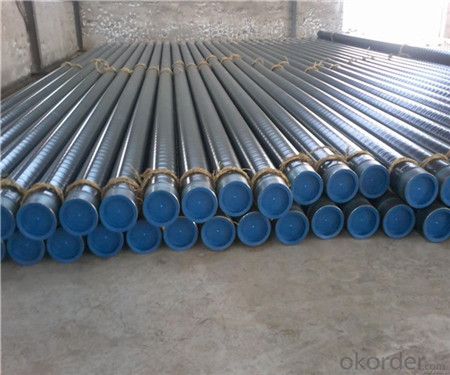
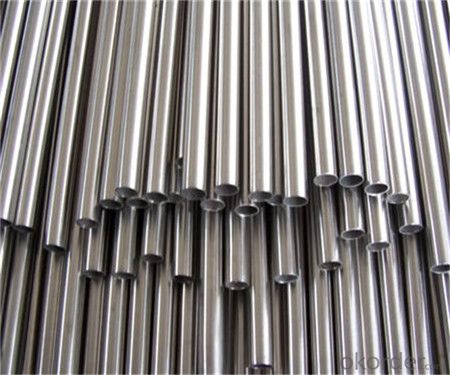
- Q: What is the purpose of a steel pipe coating?
- The purpose of a steel pipe coating is to provide a protective layer that prevents corrosion and extends the lifespan of the pipe. It also enhances the pipe's resistance to various environmental factors and improves its overall performance.
- Q: What are the different methods of repairing steel pipes?
- There are several methods of repairing steel pipes including welding, pipe wrapping, epoxy lining, and pipe bursting. Welding involves joining the broken sections of the pipe using heat and a filler material. Pipe wrapping involves applying a layer of epoxy or fiberglass wrap around the damaged area to reinforce and seal it. Epoxy lining involves applying a coating of epoxy resin on the interior of the pipe to prevent corrosion and restore structural integrity. Pipe bursting is a more invasive method where a new pipe is pulled through the existing damaged pipe, breaking it apart and replacing it in the process.
- Q: How do steel pipes compare to other materials like PVC or copper pipes?
- Steel pipes have numerous advantages over materials such as PVC or copper pipes. Firstly, their strength and durability make them ideal for high-pressure applications. They can withstand extreme temperatures and resist corrosion, making them suitable for both indoor and outdoor use. In contrast, PVC pipes are weaker and more prone to cracking and breaking under pressure or in extreme temperatures. Although copper pipes are durable, they can be susceptible to corrosion and may require additional protective coatings. Secondly, steel pipes have a longer lifespan compared to PVC or copper pipes. They are renowned for their longevity and can last for several decades without needing replacement. PVC pipes, although relatively inexpensive, have a shorter lifespan and may require more frequent replacement. Similarly, copper pipes can corrode over time and may need maintenance or replacement. Another advantage of steel pipes is their ability to handle a wide range of fluids and substances. They are commonly used in industrial applications where chemicals or corrosive materials may be present. PVC pipes, on the other hand, may not be suitable for handling certain chemicals or substances as they can react and cause damage to the pipe. Copper pipes, while generally safe for carrying water, may not be ideal for conveying certain chemicals or fluids. Additionally, steel pipes possess excellent fire resistance properties. In the event of a fire, they can withstand high temperatures and maintain their structural integrity, ensuring the safety and protection of the surrounding area. PVC pipes, however, can melt or deform under high heat, potentially causing structural damage. Although copper pipes are less prone to melting, they can still be affected by extreme heat and lose their strength. Nevertheless, steel pipes do have a few drawbacks. They tend to be heavier and more challenging to install compared to PVC or copper pipes. Additionally, they can be more expensive upfront, especially when compared to PVC pipes. However, considering their durability and longevity, steel pipes may offer better value in the long run. In conclusion, steel pipes provide numerous advantages over materials like PVC or copper pipes. They are strong, durable, resistant to corrosion, and have a longer lifespan. They can handle high-pressure applications and a wide range of fluids, making them suitable for various industrial and commercial uses. Although they may be more expensive and difficult to install, the benefits of steel pipes make them a reliable and cost-effective choice for many applications.
- Q: What is the primary purpose of steel pipes?
- The primary purpose of steel pipes is to transport fluids and gases, such as water, oil, and natural gas, over long distances in a safe and efficient manner.
- Q: How does the price of steel pipes vary based on size and grade?
- The price of steel pipes varies based on their size and grade. Generally, larger pipes tend to have higher prices due to the increased amount of materials and manufacturing processes involved. Additionally, the grade of steel used in the pipes also affects the price, with higher-grade steel pipes being more expensive. This is because higher-grade steel offers better strength, durability, and corrosion resistance, making it suitable for specialized applications. Therefore, the price of steel pipes increases as both the size and grade increase.
- Q: How do you calculate the bending moment of a steel pipe?
- To calculate the bending moment of a steel pipe, you need to consider both the applied load and the structural properties of the pipe. The bending moment is a measure of the internal forces within the pipe caused by the applied load. The bending moment can be calculated using the following equation: Bending Moment = Load x Distance Here, the load represents the external force acting on the pipe, and the distance is the distance from the point where the load is applied to the point where the bending moment is being calculated. In order to accurately calculate the bending moment, you must also consider the properties of the steel pipe. This includes the pipe's cross-sectional area, second moment of area (also known as the moment of inertia), and the modulus of elasticity. The second moment of area reflects the pipe's resistance to bending and can be calculated based on the dimensions of the pipe's cross-section. The modulus of elasticity represents the pipe's stiffness and can be obtained from material properties data. Once you have determined the load, distance, cross-sectional area, moment of inertia, and modulus of elasticity, you can plug these values into the bending moment equation to calculate the bending moment for the steel pipe. It is important to note that the calculation of bending moment assumes linear elastic behavior, which means that the pipe does not exceed its elastic limit and does not undergo plastic deformation. If the pipe is subjected to loads that exceed its capacity, the calculation of bending moment may not accurately represent the actual behavior of the pipe. In such cases, it is advisable to consult with a structural engineer or use more sophisticated analysis methods to accurately assess the bending moment.
- Q: Can steel pipes be used for scaffolding?
- Yes, steel pipes can be used for scaffolding. Steel pipes are commonly used in scaffolding due to their strength, durability, and ability to support heavy loads. They provide a stable and secure structure for workers to access elevated areas during construction or maintenance projects.
- Q: Can steel pipes be used for underground water treatment systems?
- Yes, steel pipes can be used for underground water treatment systems. Steel pipes are commonly used in underground applications due to their durability, strength, and resistance to corrosion. They provide a reliable and long-lasting solution for transporting water in underground water treatment systems.
- Q: How do steel pipes handle high-velocity flow?
- Steel pipes are able to handle high-velocity flow due to their strong and durable nature. The smooth inner surface of steel pipes allows for efficient and smooth flow of fluids, minimizing frictional losses. Additionally, steel pipes have high tensile strength, enabling them to withstand the pressure exerted by high-velocity flow without deformation or bursting.
- Q: Are steel pipes resistant to UV degradation?
- In general, steel pipes lack resistance to UV degradation. When exposed to ultraviolet (UV) radiation for extended periods, steel pipes may experience different types of degradation. The steel can become prone to brittleness, resulting in cracks and potential failure. Moreover, UV radiation can induce corrosion and discoloration on the surface of the steel pipes. To counteract the effects of UV degradation, it is possible to apply protective coatings or paint to create a barrier against UV radiation. Regular maintenance and inspections are crucial to detect any indications of UV degradation and implement necessary actions to prevent further deterioration.
Send your message to us
Seamless Hot Rolled Steel Pipe > 114.3
- Loading Port:
- China Main Port
- Payment Terms:
- TT or LC
- Min Order Qty:
- 100 m.t.
- Supply Capability:
- -
OKorder Service Pledge
OKorder Financial Service
Similar products
Hot products
Hot Searches
Related keywords
